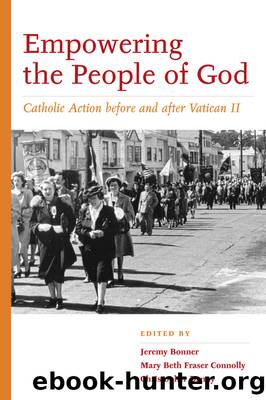Empowering the People of God by Bonner Jeremy;Denny Christopher D.;Connolly Mary Beth Fraser;

Author:Bonner, Jeremy;Denny, Christopher D.;Connolly, Mary Beth Fraser;
Language: eng
Format: epub
Publisher: Fordham University Press
Growing Up and Turning Outward
The National Council of Catholic Women was founded under the auspices of the U.S. bishops in 1920, its stated purpose being âto give Catholic women of the country a common voice and an instrument for united action.â4 At midcentury, NCCW functioned as an umbrella organization for thousands of parish-based womenâs groups across the country. In 1960, affiliates numbered 13,000.5 Margaret Mealey (1912â2006) guided the organization through the transitional years at midcentury, serving as executive director of NCCW from 1949 to 1977. Due to her prominence in NCCW, Mealey was often asked to represent Catholic laywomen nationally and internationally. She served on Paul VIâs Pontifical Commission on the Council of the Laity and observed at Vatican II. She also served on John F. Kennedyâs Presidential Commission on the Status of Women and on the citizen advisory councils of three different presidents. Through Mealeyâs influential voice, NCCW women staked a claim for themselves in the broader world.
Through biennial conferences and numerous publications, the national organization provided a forum for laywomen to organize, discuss their priorities, highlight their service to the Church on the local and national levels, and foster laywomenâs leadership. At midcentury, NCCWâs loyalty to the nationâs bishops and their policy positions was absolute, at least in its published and archived written materials. NCCWâs leadership usually spoke in reverent tones when referring to the Catholic hierarchy.
As the Second Vatican Council neared, the NCCW looked much as it had in the 1950s. Publications were largely geared toward the promotion of parish-centered events and fundraising, and the NCCW continued to pursue a socially conservative agenda. For example, a Family and Parent Education Committee panel at the 1960 conference described its purpose as affirming that the âhome was a worthy career for womenâ and instilling ârespect for large families.â The committee also set out âto fight the evils of artificial birth control, abortion, divorce and free love.â The same conference passed a resolution supporting modesty: âThe dignity of the individual woman demands that the Catholic women exert their influence in the fashion world to overcome styles which offend modesty and jeopardize virtue.â6
The NCCW continued to view itself as an instrument of the nationâs bishops. The organizationâs leadership spoke in very positive terms about the membershipâs willingness to serve in the bishopsâ larger program of Catholic Action. Bishops and clergymen were common keynote speakers at NCCW conferences and other programs, and they had an obvious relish for speaking to such dedicated Catholic laywomen, but their comments, meant no doubt to be supportive, could quickly veer into condescension. âMy dear Catholic women,â the Very Reverend Alexander Sigur told attendees of the 1960 conference, âyou are really fortunate to be invited by Almighty God to join Him through the Popes and the Bishops, in the establishment of the Kingdom of Christ on earth.⦠I really congratulate you.â Similarly, the Most Reverend John Spence gushed in 1964 that NCCWâs president, a Council visitor, had been given âa place of honor close to [the popeâs] throne.
Download
This site does not store any files on its server. We only index and link to content provided by other sites. Please contact the content providers to delete copyright contents if any and email us, we'll remove relevant links or contents immediately.
Resisting Happiness by Matthew Kelly(3197)
The Social Psychology of Inequality by Unknown(2770)
Designing Your Life by Bill Burnett(2603)
Day by Elie Wiesel(2596)
The Giving Tree by Shel Silverstein(2174)
Angels of God: The Bible, the Church and the Heavenly Hosts by Mike Aquilina(1870)
Human Design by Chetan Parkyn(1859)
The Supreme Gift by Paulo Coelho(1799)
Jesus of Nazareth by Joseph Ratzinger(1709)
Augustine: Conversions to Confessions by Robin Lane Fox(1688)
Hostage to the Devil by Malachi Martin(1676)
7 Secrets of Divine Mercy by Vinny Flynn(1620)
Dark Mysteries of the Vatican by H. Paul Jeffers(1607)
The Vatican Pimpernel by Brian Fleming(1587)
St. Thomas Aquinas by G. K. Chesterton(1557)
Saints & Angels by Doreen Virtue(1530)
The Ratline by Philippe Sands(1425)
My Daily Catholic Bible, NABRE by Thigpen Edited by Dr. Paul(1418)
Called to Life by Jacques Philippe(1410)
